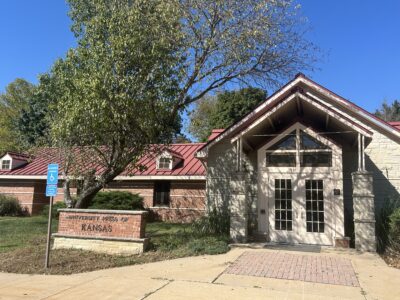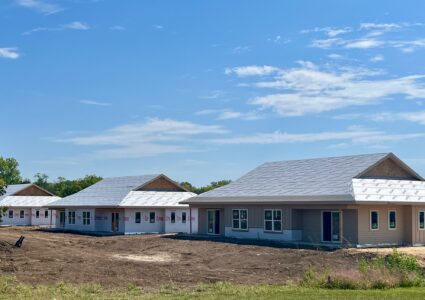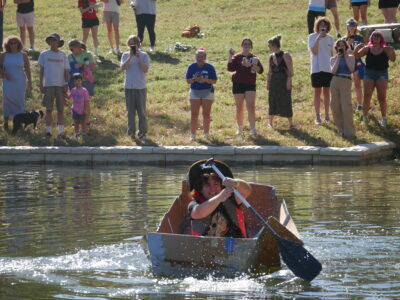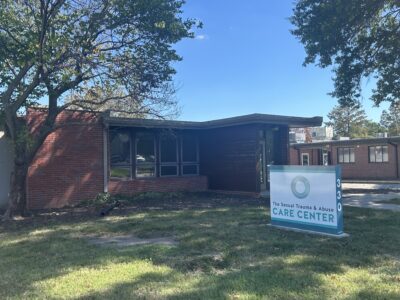Solar farm developer wants to begin limited drilling, driving of pilings on farmland site; matter now before local court
Work would be geological testing for proposed Kansas Sky Energy Center

photo by: Chad Lawhorn/Journal-World
The Midland Junction grain elevators north of North Lawrence are shown in this December 2024 file photo. The area near the Midland Junction area is proposed for a large, industrial solar farm project.
A lawsuit has stopped construction from beginning on a $234 million solar farm in the Kansas River valley north of Lawrence, but drilling, digging and driving of steel pilings may soon begin on the farmland site nonetheless.
Developers of the Kansas Sky Energy Center — a proposed 600-acre facility near the Midland Junction area of northern Douglas County — want to begin testing the soil and the site’s geology in hopes that the solar farm project will ultimately win its lawsuit and be allowed to proceed.
Douglas County District Court Judge James McCabria is being asked to determine whether the testing work can begin on the site. A group of neighbors of the proposed project are objecting, saying testing would unduly disturb the land. Douglas County officials, who would issue the permit for the testing, say they don’t have an opinion on whether the testing should be allowed, but want the court’s blessing before issuing a permit.
Both sides have presented their written arguments and are awaiting a ruling from McCabria.
At issue is a previous order from McCabria that stopped construction from beginning on the solar project while the court is considering a lawsuit by neighbors — led by Grant Township — who allege the project will create stormwater problems and violate numerous county codes.
Attorneys for the neighbors told the court in a recent filing that the proposed testing activity “plainly violates” the court’s previous order. The filing highlights information that the solar development firm included in its application to the county. Testing work proposed for the site includes:
• 13 boreholes, 17 test pits, and 12 soil sample areas each measuring 25 feet by 25 feet.
• 26 metal pilings driven to depths ranging from 6.5 feet to 8 feet.
• 9 infiltration pits that would be dug to a maximum depth of 10 feet to learn about groundwater conditions and other such geological factors.
The work would include a backhoe, a pile driving hammer, a drilling rig, a couple of pickup trucks and a crew of 13 workers, according to the application materials included in the court record.
Attorneys for the neighbors — led by the Lawrence-based firms of Fagan & Emert and the Skepnek Law Firm — argued the testing activity would violate the clear language of a December 2024 order by the court finding that “a temporary injunction preserving the status quo of the real property is appropriate.”
The Douglas County Commission — the defendant in the lawsuit — responded that the court also made statements suggesting court permission could be granted to allow physical changes to the site while the lawsuit is underway.
Terelle Mock, the Topeka-based attorney for the county, told the court in a filing that the county did not have a position on whether the permit for testing should be allowed, but rather “the county does not wish to run afoul of the order, nor does it wish to create additional litigation that could be easily avoided with direction from the Court.”
As the Journal-World reported on Wednesday, the Kansas Sky Energy Center seemingly is facing a time crunch to get construction started before a new Trump administration deadline that green energy projects must meet in order to qualify for lucrative federal tax credits.
The new deadline calls for large solar projects to be “substantially under construction” by July 6 in order to qualify for the tax credits, which likely are worth tens of millions of dollars for the Kansas Sky Energy Center project.
The July 6 deadline, however, is only three months after the expected April 6 start date of the Douglas County trial contesting the legality of the solar farm project.
Evergy — the regional utility company that ultimately would own and operate the solar farm — told the Journal-World Wednesday that it was confident the project would be able to meet the July 6 deadline and qualify for the tax credits. A spokesperson for the company, however didn’t offer details about how the project would accomplish that given that the short time between the start of the trial and the federal deadline.
What is clear is that the testing work on the property would not help the project meet the federal requirement of being substantially under construction. Federal rules don’t allow for any such preliminary work to count toward the standard.
But the testing work will be required before construction work can really get underway at the site, thus testing now likely would help the project get construction started more quickly following the lawsuit.
As for the actual amount of activity the testing work would create, it would be a small scale version of the work that the entire project would require. The Kansas Sky Energy Center is proposing about 8 million square feet of solar panels that would be supported by thousands of steel pilings. The project — which has received significant support from multiple Douglas County residents — would provide enough green energy to power about 30,000 homes per year.







